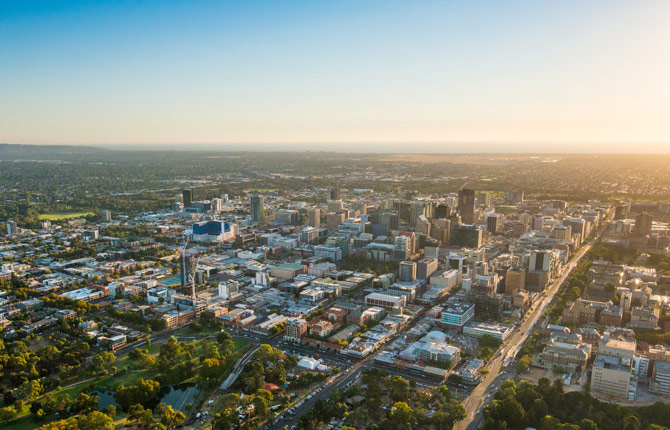
What is a regional area?
A regional area is any town, small city or area that falls beyond Australia’s major capital cities of Sydney, Melbourne and Brisbane.
This is important to know, because there are lots of benefits available for international students who choose to study in regional areas.
These can include more affordable living and a stronger sense of community, and could even mean you receive extra time on your post-study work visa.
Regional areas in Australia
Australian cities are classified into three categories:
Category 1
Major cities of Sydney, Melbourne and Brisbane.
Category 2
Cities and major regional centres of Adelaide, Perth, Gold Coast, Sunshine Coast, Canberra, Newcastle/Lake Macquarie, Wollongong/Illawarra, Geelong and Hobart.
Category 3
Regional centres and other regional areas.
The Australian Government offers incentives to individuals who migrate to areas classified as Category 2 or Category 3, including international students.
If you’re unsure whether a city or town is considered regional, you can check it against the list of designated regional area postcodes provided by the Department of Home Affairs.
What are the benefits of studying in a regional area?
Thinking about pursuing your studies in a regional area? Great choice! There are several benefits of studying in a regional area in Australia, including:
Affordability
When you live in a smaller city, your cost of living is much more affordable. Rent in urban areas such as Sydney and Melbourne tends to be very expensive, but it is noticeably lower in regional cities.
Similarly, food and public transport costs are generally lower in regional areas of Australia, meaning you can enjoy your new home without doing damage to your savings.
Stronger sense of community
In smaller cities, it’s easier to meet and get to know the people around you, which leads to a more close-knit community feel.
For instance, your class sizes at university will likely be smaller, giving you more opportunities to chat with your classmates and stand out to your professors. In regional areas, you won’t feel like just a number, but rather a valued member of the community.
Balanced lifestyle
Australia is well-known for its easy-going, relaxed way of life. Popular everyday activities include going to the beach or taking walks along the coastline.
While this can be hard to come by in the biggest, busiest cities, regional areas in Australia preserve and value this kind of lifestyle.
Universities, VET providers and colleges in regional Australia
Regional areas are home to a variety of post-secondary education providers, including universities, colleges, and TAFE institutions. Across these campuses, you’ll find a wide selection of specialty course offerings. For example, if you study in Adelaide’s Barossa Valley, you can pursue a winemaking degree. Similarly, TAFE campuses in South Australia all feature unique specialisation facilities.
For example, TAFE SA Adelaide houses a fashion design and manufacturing workshop, the Elizabeth Campus has an automotive workshop, and the Gilles Plain Campus contains a Veterinary and Applied Science Centre.
Regional visas in Australia
Studying in a regional area can even set you on a path to permanently settling in Australia. There are a number of visas you can only get if you have lived or studied in a regional area. These include the Skilled Regional visa (subclass 887), the Skilled Work Regional (Provisional) visa (subclass 491), and the Permanent Residence (Skilled Regional) visa (subclass 191).
For international students, completing studies in a regional area means additional post-study work rights. After graduating anywhere in Australia, you are eligible to apply for a Temporary Graduate visa (subclass 485), which will allow you to stay in the country for a period of two to four years, depending on your eligibility criteria. If you live in a regional area, however, you can apply for a second Temporary Graduate visa once your first one has expired, allowing you even more time to enjoy this amazing country.
What’s more, studying in a regional area will grant you an additional five points on the points test used by the Department of Immigration and Citizenship for skilled migration visa and permanent residency applications.
What makes Adelaide a great regional area in Australia for study?
Renowned as one of Australia’s most liveable cities, Adelaide is known as the city designed for life. One of the key factors that contributes to this reputation is its lower cost of living, making it much more affordable to study than other Australian capital cities.
Another factor is Adelaide’s vibrant nightlife. From rooftop restaurants to decadent dessert bars, there’s no shortage of fun things to see and do in Adelaide. You can also check out any of Adelaide’s incredible dance floors if you need to shake off some stress from school.
Adelaide also has an excellent health and safety record. Australia has one of the best healthcare systems in the world and holds a high standard of hygiene regulations for its food and water supply. It is safe to walk around the city at night, but you should still take normal precautions if you plan to do so. Adelaide also has a network of CCTV security cameras throughout the city, giving you extra reassurance that you will be safe no matter where you are.
View all News


